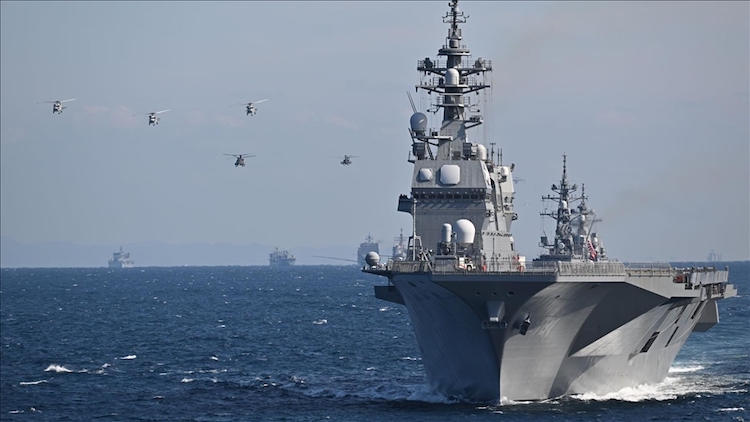Viewpoint by Jackie Cabasso
The writer is the Executive Director of the Western States Legal Foundation, based in Oakland, California.
OAKLAND, CALIFORNIA, USA (IDN) — If our attention wasn’t riveted on the midterm election results and Russia’s continuing nuclear threats in Ukraine, we would be rightly alarmed about rising nuclear tensions on the Korean Peninsula. It’s a very dangerous situation and one that presents extraordinary challenges.
Against the backdrop of Russia’s war of aggression in Ukraine and increasing military and economic tensions between the United States and China, the North Korean regime has given up on prospects for meaningful negotiations with the United States while courting favour with Russia and China in hopes of joining a powerful new anti-west alliance.
According to North Korea’s state news agency, KCNA, last month’s flurry of missile tests was carried out in response to large-scale navy drills by South Korean and US forces. Designed as a dramatic warning display, the tests simulate showering South Korea with tactical nuclear weapons.
KCNA reported that the various tests simulated targeting military command facilities, striking main ports, and neutralizing airports in the South, to demonstrate a robust deterrent capability. The North Korean Ministry of Defence also warned that the US deployment of the aircraft carrier Ronald Reagan near the Korean Peninsula is causing a “considerably huge negative splash” in regional security, and it defended its recent missile tests as a “righteous reaction” to intimidating military drills between its rivals.
Rather than ratcheting down hostilities, right now, some 26,000 Japanese and 10,000 American troops, as well as 30 vessels and 370 aircraft from both sides, are participating in a major joint military exercise, “Keen Sword,” in southern Japan. Australia, Britain and Canada are joining parts of the drills.
The unclassified version of the Biden Administration’s Nuclear Posture Review, released in October, could be read as pouring gas on the fire. Rather than issuing a clarion call for diplomacy, military restraint and new, non-nuclear global security arrangements, the new NPR doubles down on the centrality of nuclear deterrence—the threatened use of nuclear weapons—in US national security policy. While giving lip service to “a renewed emphasis on arms control,” it declares, “For the foreseeable future, nuclear weapons will continue to provide unique deterrence effects that no other element of US military power can replace….”
The NPR identifies Russia in the near term and China in the longer term as posing growing nuclear threats to the United States, its Allies and partners, describing them as “strategic competitors and potential adversaries.”
It also identifies North Korea and Iran as lesser potential threats, warning that “Any nuclear attack by North Korea on the United States or its Allies and partners is unacceptable and will result in the end of that regime.”
US President Joe Biden will be meeting in person with Chinese leader Xi Jinping during the G20 meeting in Bali next week. As an urgent priority, he should take this opportunity to begin a dialogue seeking to turn down the heat on the Korean Peninsula and in the Taiwan Strait.
The United States, South Korea and their allies should postpone joint military exercises in the region indefinitely. The US and South Korea should continue to pursue dialogue with North Korea without preconditions and put “denuclearization” of the Korean Peninsula in the context of multilateral denuclearization efforts.
The United States, Russia and China must also address a course of denuclearization if the promise of peace is to be realized. They must honour their 1970 Nuclear Non-Proliferation Treaty (NPT) obligation to make good faith efforts to pursue nuclear disarmament by seeking negotiations with the other nuclear-armed states to eliminate nuclear weapons. North Korea, which withdrew from the NPT in 2003, could, in due course, rejoin the Treaty, which promised it access to peaceful nuclear technology in return for its pledge never to acquire nuclear weapons.
With festering nuclear flashpoints in Ukraine, Taiwan, the Korean Peninsula, South Asia, and the Middle East, it’s time to go back to the drawing board. For starters, we need a bold vision for a different kind of future, where human security takes precedence over “national” security and where, as Gandhi said, nations “will want to live as much for other nations as for [themselves].”
There is no place in that future for nuclear weapons. [IDN-InDepthNews — 13 November 2022]
Photo: A Twitter shared photo by Japan Maritime Self-Defense Force of Japanese Self Defense Forces holding the International Fleet Review 2022 with the participation of naval vessels and aircraft from 13 countries. Credit: Anadolu Agency.


